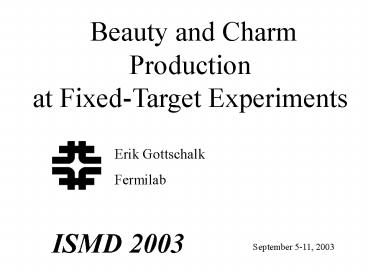Beauty and Charm Production at Fixed-Target Experiments - PowerPoint PPT Presentation
Title:
Beauty and Charm Production at Fixed-Target Experiments
Description:
SELEX reported possible signals for 3 doubly-charmed baryon states (May 2002) ... First measurements of production asymmetries for Sc baryons ... – PowerPoint PPT presentation
Number of Views:30
Avg rating:3.0/5.0
Title: Beauty and Charm Production at Fixed-Target Experiments
1
Beauty and Charm Productionat Fixed-Target
Experiments
2
Overview
3
Current Fixed-Target Experiments with Recent
Publications
4
5
HERA-B
920 GeV protons from HERA Nuclear targets
(wires) in beam halo Di-lepton (??, ee) trigger
- Physics topics
- ?(b)
- Charmonium production suppression in
nuclear matter - Min. bias physics
Data run 2000 8k J/?s run 2002/3
300k J/ ?s, 200M m.b. events
6
J/? Sample From 2002/3 Run
M(??-)
Total 300,000 J/? in both channels -0.3 lt xF
lt 0.1, 0 lt pT lt 5 GeV
dN/dxF (J/? ?ee-)
uncorrected
M(ee-)
7
The HERA-B ?(bb) Measurement
1) Trigger on J/?
b ? J/? X ? ? ?- X b ? J/? X ? e e- X
2) Identify
via detached J/? vertices.
upstream downstream
3) Normalize to ?(J/?) (combine E789, E771, use ?
from E866 356 nb/nucleon.)
(Plots from Run 2000)
8
b Signal, ?(b)
(after impact parameter, detached vtx cuts)
Run 2000 result
40 of Run 2002/3 data
??-
ee-
?TOT(bb) nb/nucleon EPJ
C26 345, 2003
(based on ? 11 detached J/?)
much improved ? estimate soon
9
10
SELEX reported possible signals for 3
doubly-charmed baryon states (May 2002)
- ccd candidate at 3520 MeV/c2
- three independent analyses find the same signal
- wrong-sign combination with K shows no peak
11
SELEX reports possible signals for 5
doubly-charmed baryon states (Hadron 2003)
12
SELEX observations on the production of
doubly-charmed baryon states
- Decay properties
- four narrow states all decay weakly
- lifetimes lt 33 fs (expected 100-1000 fs)
- photon coupling must be highly suppressed
- different L means level split is not due to
spin-flip - Production issues
- 20 of Lc are produced by ccd(3520) decay
- doubly-charmed baryons are produced by baryon
beams - within statistics, protons are at least as
effective as S- in producing these states - FOCUS has 12x more Lc events than SELEX,
and does not see doubly-charmed baryons in a
wide range of decay modes - E791 (p beam) has 5x as many Lc events, and
does not see doubly-charmed baryons - confirmation (or refutation) in other hadron
experiments is crucial
13
Charm Production Asymmetries
Perturbative QCD calculations predict very small
charm production asymmetries.
Fixed-target experiments often observe large
asymmetries for charm particles, and
theasymmetries are often attributed to the
leading particle effect. A leading particle
(L)has valence quark(s) in common with the beam
(or target) particle.
Since perturbative QCD has not been able to
account for production asymmetries (seeTom
Mehens talk), the best tools we have available
now are models that can reproduceexisting
experimental data so that these models can be
used to study charm production.
14
Ds Asymmetry from E791 (500 GeV p-) E781/SELEX
(p- , S -, p beam)
E781/SELEX S - beam (Ds asymmetry)
E791 p- beam (Ds asymmetry)
15
D Asymmetry from E791 (500 GeV p-) E781/SELEX
(p- , S -, p beam)
E781/SELEX S - beam (D asymmetry)
E791 p- beam (D asymmetry)
E781 Preliminary
16
Charm Baryon Production Asymmetries from
E831/FOCUS (180 GeV g beam)
E831/FOCUS Lc asymmetry
Asymmetry comparisons to default Pythia 6.203
E831/FOCUS Preliminary
- First measurements of production asymmetries for
Sc baryons - Pythia 6.203 (with default settings) is not able
to reproduce these asymmetries - another test for the Heavy Quark Recombination
model?
17
Charm-pair events in FOCUS (180 GeV g beam)
The FOCUS sample of DD events was
reconstructedusing the decay modes D0 K-p, D
K-pp , D0 K-pp p-, and charge conjugate
modes.Except for a few minor
discrepancies,PYTHIA 6.203 does an excellent job
ofmodeling photoproduced charm-pair events.
- Cuts
- NPrimary 2
- no energy in EM calorimeters
18
Results for fully-reconstructed charm pairs
19
Results for fully-reconstructed charm pairs
20
Results for partially reconstructed charm pairs
Df (radians)
21
Future charm-pair studies from FOCUS
Can FOCUS do any more studies for doubly
charmedbaryons? Study charm-pair events with
same-sign kaons?
Preliminary
22
Summary
- I have shown recent results from fixed-target
experiments on beauty and charmproduction. - I would like to thank the following people for
help in obtaining these results - Jeff Appel (E791)
- Robert Kutschke (E831/FOCUS)
- Michael Leitch (E866/NuSea)
- Michael Medinnis (HERA-B)
- Stephen Pordes (E835)
- Jim Russ (E781/SELEX)
- Kevin Stenson (E831/FOCUS)
- Cecilia Uribe (E831/FOCUS)

